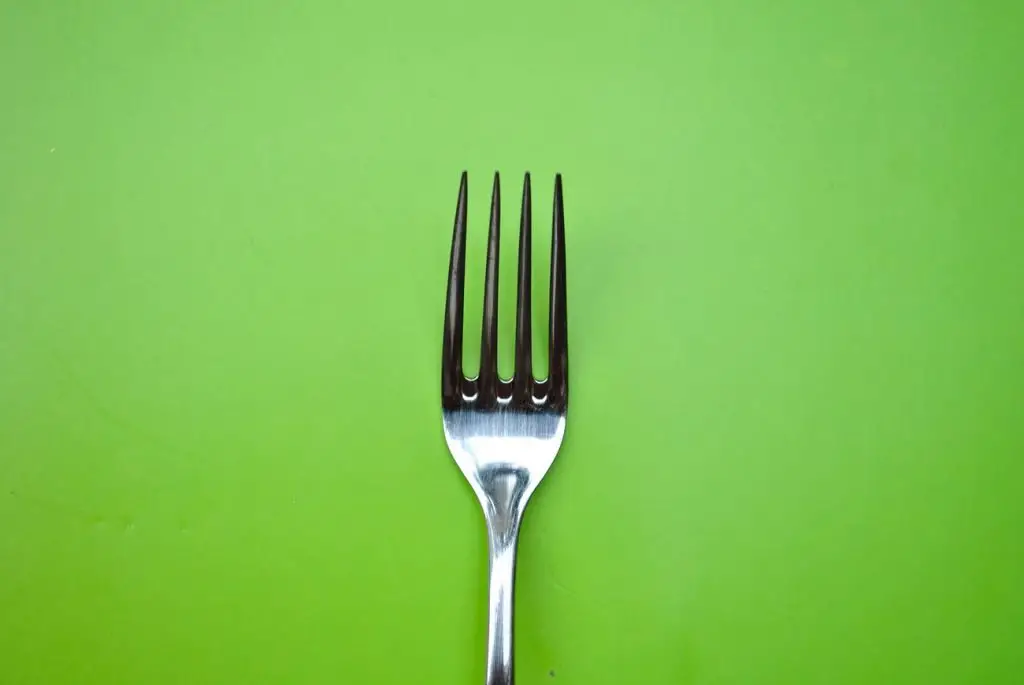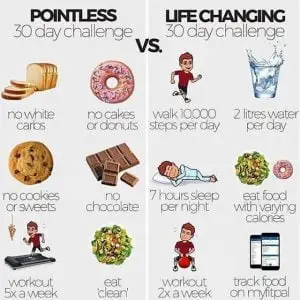Weight loss requires you to consume fewer calories than you burn to create a “calorie deficit”.
Naturally, and as most people do, you begin running or hitting the gym a few days a week, you start eating smaller portions and cutting your calorie intake.
However, the process is simply not easy. Which makes you think about starving for weight loss to hit your goal quickly.
Starvation can be self-inflicted (our today’s topic) or due to the presence of other conditions like anorexia or bulimia.
It is often accompanied by a severe deficiency in your daily calorie intake which may result in some immediate change.
But, what happens to your body when you start starving for 1, 2 or even 7 days? Does starving harm your health or it is an effective way to reduce body fat?
Keep reading.

Starving For Weight Loss
When you lose a lot of weight in a short amount of time, your body starts trying to conserve energy by reducing the number of calories it burns.
Which makes you feel hungrier, lazier, and increases food cravings.
These effects can cause you to stop losing weight and make you abandon your hard efforts, due to your brain’s natural mechanism that protects you from starvation.
This article discusses the concept of starving for weight loss, including its effect on your body composition and health.

How To Use Starving For Weight Loss?
A lot of people claim that starving yourself can be effective for weight loss. So, how to starve your body to lose weight without negatively harm your health?
The answer is quite simple; stay away from foods that slow down your fat loss process!
Sounds easy, right?
However, you must understand that you can not simply get to the point where you ban these foods overnight, this means that you have to take the process gradually.
For example, start by cutting back on sugars and starches, next replace your high-calorie drinks by water.
After this, you should begin thinking about reducing the number of times you eat each day. Also, ensure that you are following a healthy and balanced diet.
The basic model for weight loss is simply predicated on calories in vs. calories out.
In meaning, if you use more calories each day than you burn, chances are you will gain weight.
On the contrary, by simply creating a calorie deficit burning higher numbers of calories than you consume, you will lose weight.
As stated above, “hardcore dieters” opt for an all-or-nothing approach for weight loss.
Therefore, they go for very-low-calorie levels than the recommended thus leading to quick weight loss.
Yes, starvating for weight loss might help you reach your body goal quickly, but this may be at a cost!
What Happens To Your Body When You Start Starvation?
Recent studies show that people who used starvation for weight loss, eating roughly 50% of their energy needs for 3 weeks, did decrease their body weight overall.
However, if the state of starvation is maintained chronically, lean muscle mass and organ size will be decreased by 20%.
Starvation for weight loss causes individuals to lose significant amounts of lean muscle mass and lean body mass, which includes water, bones, organs, etc.
Reducing the mass of your bones decreases its density which makes you more prone to injury.
Another study shows that dropping significant amounts of daily calorie intake leads to immediate weight loss and decreased lean muscle mass.
However, participants also gained back nearly all the pounds they lost using starving for weight loss, within 8 years.
This prompts the discussion and understanding of an important topic: Metabolism (More about this later).
Does Starvation Overcome Weight Loss Plateau?
A weight loss plateau can be caused by many things
When you first attempt to lose weight, you may experience fast results.
However, things may slow after that. In some cases, weight loss slows so much that many weeks can go by without any noticeable change on the scale.
And this doesn’t mean that you aren’t losing weight.
For example, water retention can often give the impression of a weight loss plateau.
Despite experiencing rapid results when you first attempt to shed pounds, your weight loss may slow or stop altogether.
This is known as a weight loss plateau, which can have many causes and solutions. Starting starving for weight loss may not be the best thing to do to deal with this situation. Instead, you may want to boost your metabolism.

What is Metabolism?
Metabolism describes all the chemical processes that go on continuously inside your body to keep you alive and your organs functioning normally, such as breathing, repairing cells and digesting food.
These chemical processes require energy. The minimum amount of energy your body requires to carry out these chemical processes is called the basal metabolic rate (BMR).
Do Some People Have a Faster Metabolism Than Others?
Body size, age, gender and genes all play a role in the speed of your metabolism.
Muscle cells require more energy to maintain than fat cells, so people with more muscle than fat tend to have a faster metabolism.
In general, men tend to have faster metabolism because they have more muscle mass, heavier bones, and less body fat than women.
Am I Fat Because of a Slow Metabolism?
People who struggle to lose weight often blame a slow metabolism.
But, there’s little evidence to support this claim.
Research shows that overweight people have faster metabolism than thinner people.
Wondering why?
Simply, because larger bodies require more energy to carry out basic bodily functions.
Putting a “slow metabolism” to one side, something else may be at play here.
It may be hard to accept, but staying on top of the number of calories you eat is key to losing weight and keeping it off.
Does Starvation For Weight Loss Slow Down My Metabolism?
Crash diets and other calorie-restricted diets can slow your metabolism.
Starving for weight loss force your body to break down muscle to use for energy.
The lower your muscle mass, the slower your metabolism.
With less muscle and a slower metabolism, it then becomes a lot easier to put body fat back on after coming off the diet.
What Can I Do To Speed Up My Metabolism?
While you don’t have much control over the speed of your metabolism, you can control how many calories you burn through your level of physical activity.
The more active you are, the more calories you burn.
Some people who are said to have a fast metabolism are probably just more active than others. That being said, here are the 3 most effective ways to boost metabolism:
Do High Intensity Interval Training
HIIT involves quick and very intense bursts of activity. It can help you burn more fat by increasing your metabolic rate, even after your workout has finished.
This effect is believed to be greater for HIIT than for other types of exercise. What’s more, HIIT has also been shown to help you burn fat.

Lift Weights
Muscle is more metabolically active than fat, and building muscle can help increase your metabolism.
This means you will burn more calories each day, even at rest.
Lifting weights will also help you retain muscle and fight the drop in metabolism that can occur during weight loss.

Do Aerobic Exercise
Aerobic exercise may not build big muscles, but it can rev up your metabolism.
The key here is to push yourself to the maximum. High-intensity exercise delivers a bigger, longer rise in resting metabolic rate than low- or moderate-intensity workouts.
To get more benefits, try an intense class at the gym or include short bursts of jogging during your regular walk.

Metabolism and resting metabolic rates are directly linked to lean body mass.
A person with greater body mass will require more energy to function day to day, thus will have a larger basal metabolic rate (BMR). As weight decreases, so do BMR.
This means that there’s a certain number of calories necessary to maintain your lean mass.
If you go below this number, your body will be forced to break down these muscle stores to create energy.
Starvation diets have far-reaching negative effects on the body.
Starving to lose weight changes the metabolism, reduces lean muscle, reduces bone density, and decreases strength.
What Happens When You Stop Starvation?
Perhaps you have already opted for a very low-calorie diet, placing your body in starvation mode.
You’ve decreased your body weight and now you’re ready to return to “normal” eating.
So far, your body has also responded to starvation for weight loss by losing muscle mass and decreasing BMR.
But, something else interesting happens to the body after a period of starvation.

The body’s systems do not “reset” after starving for weight loss.
What does that mean?
The body tunes itself to focus on significant weight loss at the expense of body fat mass, lean muscle, and other lean mass. It reduced its basal metabolic rate.
Yet, once a person returns to a normal calorie level, the body can not adapt to the change and it will store the extra calories as fat.
This is because the body is now primed to replenish the lost fat stores, not lean muscle, lost during starvation.
Starving to lose weight makes your body more likely to use a new basal metabolic rate.
One of the reasons this may be the case is because blood leptin levels decrease in individuals who use starvation for weight loss.
Leptin is the hormone that signals satiety. It is produced by fat cells and helps to regulate energy balance and inhibit hunger. In short, it signals the brain that you are not hungry.
Yet, those who starved for greater weight loss lowered their leptin levels, putting them at risk of regaining the weight because the body wasn’t signaling the brain correctly.
The body’s system didn’t “reset” itself until all the body fat lost during the period of starvation was regained. Lean individuals were more likely to gain more fat after starvation.
Why Starving Yourself is Bad For Weight Loss?
Most of us want to lose weight. But unfortunately, many people believe that to get in shape, you need to starve yourself.
Yes, it makes sense that if you eat very little then you will lose those pounds. But, that’s the worst possible thing you can do. Starving yourself is bad for weight loss.
Body fat is quite simply stored energy. When you eat food, your body will burn some of the calories but it stores whatever is leftover in the form of fat.
To lose the excess body fat, you need to give your body a reason to lose it.
The biggest mistake many people make is not eating while working out like crazy. But when you start starving for weight loss a few things happen to your body.
Your body goes into “survival mode”, your metabolism slows down and your body starts to store more fat.
Another reason you shouldn’t starve yourself is that food provides valuable nutrients that your body needs to function correctly.
Lastly, when you consume a meal after you’ve been starving yourself, your body processes it differently.
Since your metabolism has slowed down, your body will store it instead of using it.
So, it other words, you end up gaining more body fat.
Starving For Weight Loss – Side Effects
Malnutrition
Starvation usually means that you don’t eat much at all which leads to many essential nutrients and vitamins being excluded from your diet. This is perhaps the most damaging effect of starvation.
Dehydration
Lack of food for a long period slows down the body’s energy stores and poor nutrition, which is often related to dehydration.
Thus, it is important to remember to drink enough water, even if you are on a starvation diet. Starvation and dehydration depletes glycogen levels and disturbs electrolyte balance.
Decreases Resting Metabolic Rate
Starvation for a long period decreases metabolic rate as you are depriving your body of food and water, which almost exhausts its energy balance.
Bone Loss
A starved or starving individual may continue to lose weight at an alarming rate.
Although the changes in the skin and muscles are quite obvious after starting starvation for weight loss, the bones also decrease their overall strength and lose their density.
Fatigue
One of the most common side effects of starvation is fatigue.
Starvation upsets the balance of essential vitamins in your body and slows down physiological processes, which can lead to fatigue and a feeling of stress.
Prolonged starvation impairs brain function and exhausts all the glucose needed for the effective functioning of cognitive abilities.
Starvation For Weight Loss – Final Thoughts
Having considered starving your body to lose weight, we must point out that your health should be your top priority.
Do not adopt extreme measures that may solve one problem and create another.
Starvation leads to many harmful effects. It can also affect how you react to stress, induce feelings of anxiety and irritability, and lead in some cases to chronic diseases.
Getting in shape is more gratifying when your total health and wellbeing are at an optimum level.
Thus, starving for weight loss may not be the ideal approach to adopt in this case. Instead, Opt for a balanced and healthy diet to lose weight.
Click here if you want a custom weight loss diet plan according to your individual goals.



